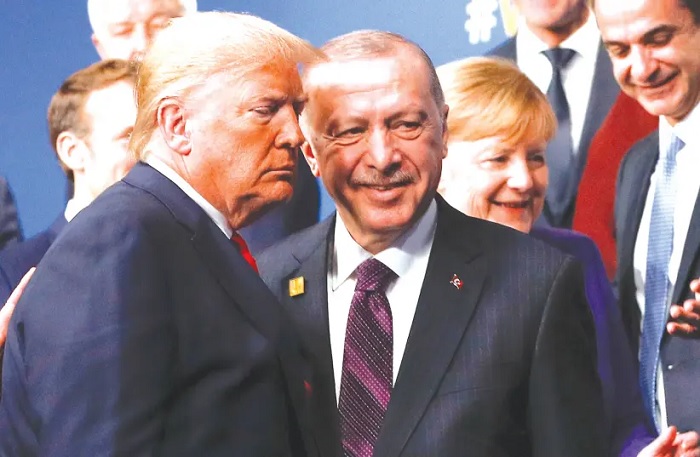
As an elected official with many family members living in Israel, I’m occasionally asked by family members, friends, constituents – and especially my fellow Israeli-Americans or Jewish-Americans with close ties to Israel – why I don’t support Donald Trump. I hear comments about Trump deserving Jewish and Israeli-American support because he’s the president who recognized Jerusalem as the capital of Israel, and the Golan Heights as part of Israel. In recent weeks, the refrain has been expanded to include Trump’s involvement in helping to achieve peace between Bahrain and Israel and the United Arab Emirates and Israel.
Regrettably, the full picture of Trump’s record vis-à-vis Israel is far more reckless than perceived by many people who truly care about the future of the Jewish Democratic state.
Despite his bluster, under President Trump’s watch, Iran has become a far greater threat to Israel. Over the past year Iran has stepped up its development of nuclear weapons. In a leaked confidential dossier, the International Atomic Energy Agency reported that between 2019 and early 2020, Iran increased its amount of enriched uranium from 820 pounds to 2,250 pounds. Multiple Israeli media outlets have reported that Iran might have a nuclear bomb by the end of the year, and that Iran has been cooperating with North Korea on long-range missile technology.
Unfortunately, despite Donald Trump’s bragging about it, his “great relationship” with North Korean strongman Kim Jung Un has paid no dividends on the Korean Peninsula or in the Middle East. The Trump administration’s inability to check the influence of Iran in Syria and in Lebanon (and its acquiescence of Russia’s vastly expanded influence in Syria and Lebanon) has resulted in the Iranian ally Bashar Assad remaining in power in Syria, and Hezbollah stockpiling tens of thousands of missiles with greater accuracy and range than what Israel faced in the last Lebanon War.
Iran isn’t the only nation-state in the Middle-East that has become a greater threat to Israel in the past few years, as Turkey now merits equal concern. Turkey’s President Recep Tayyip Erdogan has abandoned his country’s historic position as a moderate Muslim nation in favor of aggressive and theocratic policies. The Jerusalem Post recently reported that Israel’s intelligence community now views Turkey as an even greater threat than Iran. Unfortunately, President Trump has not only ignored Turkey’s backsliding from democracy, he’s embraced President Erdogan despite his constant anti-Israel rhetoric and actions – both of which undermine Israel’s security and diplomatic prospects.
Topping the list of Turkey’s egregious actions was its attack on the Kurds. This humanitarian crisis would not have occurred had the Trump administration not ordered American troops to withdraw from northern Syria, where we had been supporting our longtime Kurdish allies. Our troops leaving didn’t just result in a massacre that betrayed American and Jewish values, it was a severe setback for Israel.
Israel’s new treaties with the UAE and Bahrain, as well as decades-old treaties with Jordan and Egypt, aren’t borne out of friendship between peoples, they are strategic alliances between governments. Jordan recently threatened to abrogate its peace treaty with Israel. For signing the peace treaty with Israel, the UAE will receive stealth fighters that will harm Israel’s qualitative military advantage. The establishment of a Kurdistan would have provided Israel with something it doesn’t have in the region: a true friend, irrespective of how the wind blows on a given day.
In normal circumstances, the bonds between countries are more important than the bonds between the leaders of those countries. However, Donald Trump doesn’t operate that way, as he places a huge emphasis on the personal relationships with foreign leaders in determining policy. This has led him to embrace anti-American world leaders such as Erdogan, Kim and Russian President Vladimir Putin. Trump has a good relationship with Benjamin Netanyahu. However, Netanyahu’s days as prime minister are coming to an end, as in late 2021, Benny Gantz, of the more centrist Israel Resilience Party, is scheduled to take over.
Gantz and Trump aren’t as ideologically simpatico as Trump and Netanyahu. It’s frightening to think that if there is friction between Gantz and the president, it could alter Trump’s attitude toward Israel, but Donald Trump’s problematic personal interactions with the leaders of several friendly nations have resulted in frostier relationships with longtime allies.
The question pro-Israel voters should always ask is whether Israel is safer than it was four years ago. In the coming years Israel will face growing security and diplomatic challenges: eliminating Hezbollah’s control in Lebanon; reducing the threats of Turkey, Iran and Syria; neutralizing Russia’s ascendancy in the region; and of course, resolving the entire Arab-Israeli and Palestinian-Israeli conflicts.
None of these will be easy achievements and they all need two prerequisites: a president who recognizes that the United States is the indispensable nation who recognizes that US foreign policy is most effective when we build alliances with nations that share our values. Donald Trump’s foreign policy has resulted in America both retreating from the world and acting unilaterally – both of which have diminished our influence and our popularity around the world.
Joe Biden has been a friend to Israel for decades and is well-known and respected in the mainstream Israeli body politic. A President Biden will rebuild our traditional alliances and recognize despots for who they are. Joe Biden has stated that he will keep America’s recognition of Jerusalem as Israel’s capital and that he won’t compromise Israel’s qualitative military edge. Most importantly, Joe Biden knows that an America that is engaged throughout the globe is stronger and more secure, and that’s not just good for the United States and our values, but for Israel, too.
 Eurasia Press & News
Eurasia Press & News

